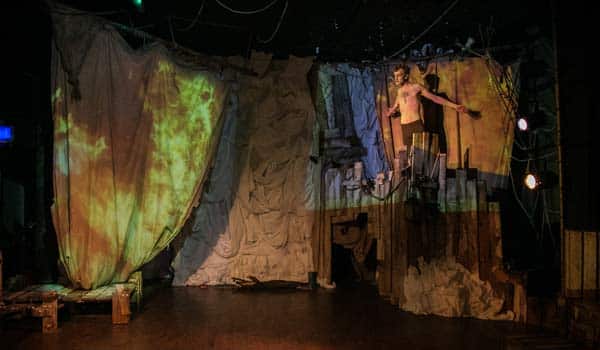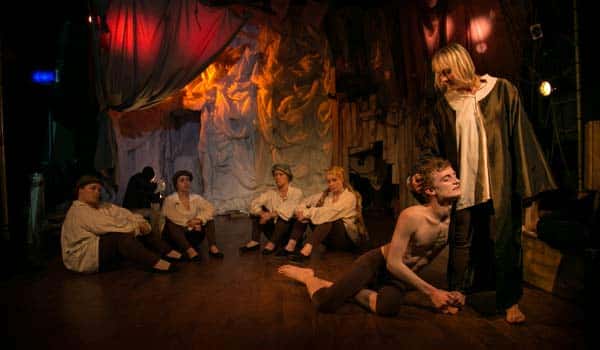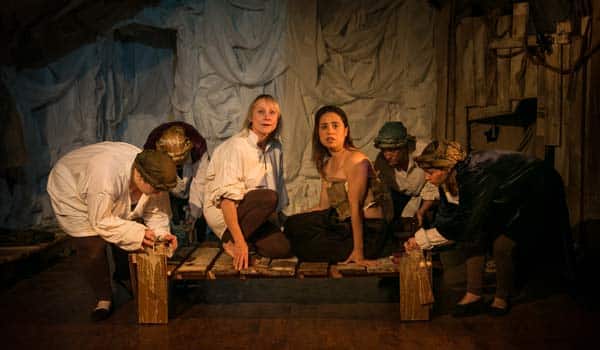The Tempest
14/10/15
Eel Brook Theatre, Fulham
4 Stars
Shakespeare’s final play never disappoints. From every production or adaptation I have seen over the years I have learned something new, however much I might have disliked the governing concept. There is such a formal variety, metaphorical density in the language, and expert dramaturgical craft in the construction that each occasion offers a new unpacking of a rare insight, perhaps not even intended or appreciated by the creative team responsible. There is no waste, no padding, no excess or superfluity. It is a truism, but still of course true, that Prospero, the sovereign magician who finally buries his book, breaks his staff and frees his ‘aery sprite’, is Shakespeare himself both summing up and saying farewell to his art.
 For such a highly wrought, self-consciously created work it is also very flexible, capable of many different interpretations…anti- or post-colonial, Prospero as magus (Dr Dee) or impresario (Peter Greenaway). There is no one map for navigating this miraculous island which is not merely ‘full of noises’, but replete with a world of almost infinite suggestion. One key to success seems self-evident though. Any production would be wise to use the full resources of stage craft – sound, light, music, costume, make-up, set design, video projection and choreographed movement – for this play is as near as a play gets to the world of opera and ballet which seeks to unify all the arts in common cause.
For such a highly wrought, self-consciously created work it is also very flexible, capable of many different interpretations…anti- or post-colonial, Prospero as magus (Dr Dee) or impresario (Peter Greenaway). There is no one map for navigating this miraculous island which is not merely ‘full of noises’, but replete with a world of almost infinite suggestion. One key to success seems self-evident though. Any production would be wise to use the full resources of stage craft – sound, light, music, costume, make-up, set design, video projection and choreographed movement – for this play is as near as a play gets to the world of opera and ballet which seeks to unify all the arts in common cause.
It is one of the most notable achievements of this continuously intriguing and thoughtful production from London Theatre Workshop that they get this point entirely, and use the discipline of a tiny budget to generate a sensuous and kinetic experience that takes you well away from a wet night in Fulham into a world of magical suggestion that many lavishly funded productions miss altogether.
The set impresses at first sight. Two square sails dominate, one above an old pallet (which doubles as the tiny boat in which Prospero and Miranda are set adrift), the other placed above a cave mouth, slatted with wood, which is Prospero’s cell. The back walls are stuffed with crumpled white paper to symbolise the waves and cliffs of the island. There is a scatter of books and wooden boxes around the sides and that is all.
Yet these apparently meagre resources do major work in conjuring up atmosphere and colour. The sails are used as projection screens for the storm scene, the books come to life as birds and magic viands but not in a way that imitates Prospero’s Books, and the platform gives vertical dimension to the action and a vantage point for both Prospero and Ariel to survey the scene. Above all there is still enough forestage space for elaborate schemes of movement that allow all characters to be present on stage offering visual interpretation of the text at key points. Designers of set and props have squared imagination and economy to produce some very fine results – all credit to Justin Williams, Harry Johnson, Anna Nguyen and Dominika Visy.
 Integrated with this is a well sustained sound-track which runs pretty much continuously from the arrival of the shipwrecked dignitaries on the island until magic is abjured. The island really is ‘full of noises’ throughout in a compelling and plausible way, thanks to the electronic sound design of Edmund Shaw and James Neale’s beguiling music and songs. The overall effect is one of both beauty and uneasy mystery which seems entirely right for a world of ‘rough magic’.
Integrated with this is a well sustained sound-track which runs pretty much continuously from the arrival of the shipwrecked dignitaries on the island until magic is abjured. The island really is ‘full of noises’ throughout in a compelling and plausible way, thanks to the electronic sound design of Edmund Shaw and James Neale’s beguiling music and songs. The overall effect is one of both beauty and uneasy mystery which seems entirely right for a world of ‘rough magic’.
Costume and lighting designs also manage to do a lot of work with limited means. The lighting team of Jordan Lightfoot and Ben Homer get us off to a deft jolt of a start with a very effective storm and ship-wreck and Evie Holdcroft and Ray Rackham give each character a distinctive and suitable outfit that tells you immediately something of their rank and status while also finding exotic touches too. A twist of a turban for a nobleman, a suitably spangly magic gown for Prospero, a rough pelt for an already naturally hirsute Caliban….
And so to the casting and players. This is a gender-blind production in which there are six women and three men. The actors playing Miranda and Ferdinand also double as Trinculo and Stephano, and Ariel appears as the bosun. This strategy did not create any problems that I could see and did not get in the way of convincing performances as it might have done had Ferdinand or Caliban have switched genders too. Prospero in particular does not strike me as an inherently gendered role – what is needed is natural and sometimes alarming authority and then the ability to give it away. Gender is not the issue here. Ralph Richardson once said that when John Gielgud came on stage the audience did not need to be told he was the Duke of Milan – he just obviously was; whereas when he (Richardson) came on they assumed he was a plumber!
Karen McCaffrey’s Prospero is a performance put together at short notice through a last-minute change of casting and deserves praise despite inevitable limitations. Her delivery of the text was careful, well-pointed and always clear, but lacked the variety of colouring and nuance that more rehearsal time might have provided. She was more at home in giving away authority and putting the microcosm of the island to rights than in in displaying anger and brusque, imperious sovereignty. Her relationship with Joseph Law’s Ariel was touching and less manipulative than is usual – there was in fact a lot more tenderness on show than is usual in this role, and well before forgiveness becomes the order of the day in the final act. The strengths and weaknesses of her approach were in evidence in her delivery of that extraordinary speech ‘Ye elves of hills, brooks, standing lakes and groves’ where the emotional and technical range needs to move from dangerous Lear-like rage to genial acceptance and forgiveness. There was too little of the former, but the latter impressed.
As Miranda and Trinculo, Samantha Béart gave two very impressive and contrasted performances, with a common feisty energy and bustling inventiveness, and detailed attention to text. Stevie Basaula was less in touch with the formalities of Ferdinand’s careful diction but fully at ease with the broad-brush comedy of Stephano’s drunken buffoonery. Ruskin Denmark was a consistently fine Caliban, acting with physical bravura and great sensitivity to the words – you felt every pinch and prick with him, and when needed he was not afraid to embrace the rhetorical demands of some of the finest poetry of the play. Joseph Law’s Ariel was equally good – so much of the energy and direction of the action is devolved to him by Prospero that Ariel needs to be a quicksilver impresario if the events are not to drag. This he was, both vulnerable, mysterious, and alarming as circumstances needed, with some lovely touches of comic invention to top it off.
The shipwrecked party of Sebastian, Gonzalo, Alonso and Antonio were directed very much as a group, and were present as a kind of chorus for much of the action, echoing the mood of the scene in well-modulated movement. This served to give their sub-plot greater prominence than usual and there were plenty of opportunities for individuals to shine in both comedy and empathy. Marie Blount’s Gonzalo was perhaps the most expressive of all as the conscience of the audience, reminding us of the wrongs done to Prospero and Miranda.
Director Brandon Force and movement director Liam Steward-George deserve great credit for creating such a dynamic and detailed production with continual visual, choreographic and textual exploration at its heart. Crucially they do not try to dissolve or explain all the mysteries and enchantments of this endlessly fascinating play but set out simply to evoke them memorably. So when the revels are ended and you are returned to an autumn night in Fulham, ‘You do yet taste some subtilties o’ the isle, that will not let you believe things certain….’
The Tempest runs at London Theatre Workshop until 24th October


